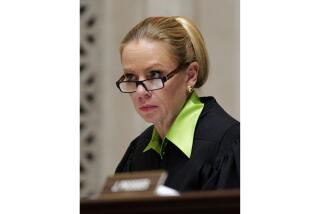Lewis to Leave Appeals Court, Return to Private Practice
After 2 1/2 years on the appellate bench and more than a decade as a judge, Justice Gerald J. Lewis of the 4th District Court of Appeal announced Thursday that he will resign to return to private practice.
Lewis, a conservative La Jolla Republican, said he was “getting close to having done what you can do” as a judge and had several exciting, but not yet formalized, business opportunities to pursue.
The 53-year-old judge will become counsel to the Los Angeles-based Latham & Watkins law firm, which has a growing, 38-lawyer San Diego office. In that capacity, he will spend about one-third of his working time with the firm, advising on cases at its offices in California, Chicago, New York and Washington.
“We consider him an extraordinary resource with great sensitivity to the judicial process and to common business sense,” said Paul I. Meyer, a partner with the firm in San Diego.
Lewis also plans to engage in private mediation and arbitration after his resignation, which will take effect May 1.
“There is life after the appellate courts,” joked Lewis’ colleague, Presiding Justice Daniel J. Kremer. “We’re going to lose a very valuable member of our court and one I’ve enjoyed working with in the two years I’ve been here.”
Lewis was appointed to the appellate court by Gov. George Deukmejian in October, 1984, about six years after he won election to the San Diego County Superior Court in a hotly contested race.
His judicial career began with his selection by the county Board of Supervisors as judge of the Ramona Justice Court in 1975. Lewis became a Municipal Court judge when the Ramona post was consolidated with the El Cajon Municipal Court several weeks later.
There, he was a member of the so-called “El Cajon Mafia”--the cadre of jurists who won expanded powers for the East County court and gained a national reputation for administrative innovation.
Lewis said he began seriously considering a career change last year, when judges across the state faced the threat of Proposition 61. The ballot measure, the brainchild of anti-tax crusader Paul Gann, would have limited public employees’ benefits and pay--slashing appellate judges’ pay, in particular, by about $20,000.
The proposition failed by a 2-1 margin in the Nov. 4 election, but not before catching Lewis’ attention.
“Even though that didn’t pass, it started me thinking,” he said. “And it’s dangerous to get a judge thinking.”
Kremer noted that pay considerations weigh heavily on many judges. “It’s evident on the federal bench probably more than in California that the salaries of judges lag far behind what those judges see the practitioners in front of them making,” he said. “But it’s true in the state courts as well.”
The vacancy created by Lewis’ departure will be filled by another Deukmejian appointee. Among the likely candidates is Superior Court Judge Patricia Benke of San Diego, who made the governor’s list of potential nominees to fill three openings on the state Supreme Court but was not elevated.
More to Read
Sign up for Essential California
The most important California stories and recommendations in your inbox every morning.
You may occasionally receive promotional content from the Los Angeles Times.










